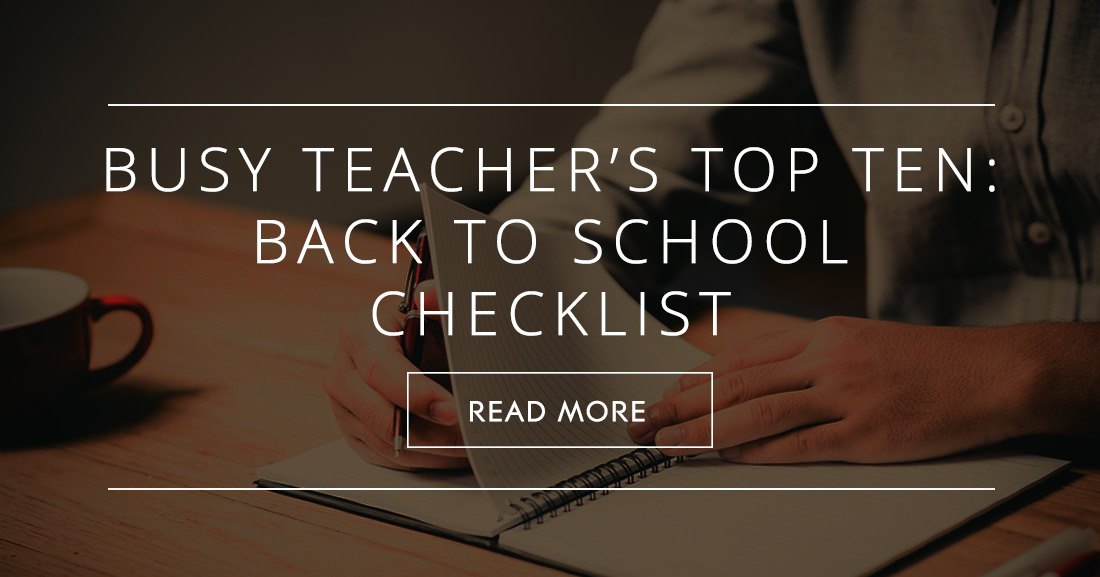Getting Ready for Your Best Year Ever: Start Now to Make a Difference Once School Starts


Teachers have a lot of work to do to be ready before their students return to class. Make sure you are not missing anything with this back to school checklist.
Lessons plans are the most important element to a successful start to the school year. As a teacher, you want to feel organized and in control from the first day of class. If you have been teaching one year or twenty, it is valuable to ✔ go through your teaching notes from last year and perhaps even earlier. Hopefully, as you went through the year, you marked which activities were successful with your students and which ones you planned to avoid in the future. Now is the time to look at these notes, not the day before you are getting ready to teach that lesson. If you take the time out now, you can focus more of your time and attention on the lessons which need more while being reassured that you have a firm handle on your other lessons.
If you are a first year teacher, you may have a little more work to do than someone with prior years to fall back on. If this is the case, ✔ do a rough plan of your entire school year and all the subjects you will teach. If you have nine months of class and twelve chapters to cover in grammar, you will have to cover each chapter in approximately three weeks. You should make a plan for each of your subjects so you know exactly how quickly you must cover the material. While you are planning your year, be sure to schedule in make-up days or even make-up weeks. This way when you get behind, as most teachers find is inevitable, you know you will have an opportunity to make up the material you missed. Scheduling these times before the year even begins will decrease your stress level and your students’, too because you will never feel the pressure that you will never catch up with your original schedule.
Having your own classroom can be both a blessing and a struggle. Teachers often find themselves frustrated because decorating is the last thing they have on their minds. ✔ Keep your classroom simple yet stimulating for your students. There are many bulletin board designs that you can simply tweak to last the whole school year. For example, turn one bulletin board into a tree, and each month change the item on the tree – apples in fall, icicles in winter, flower buds in spring and fruit near the end of the school year. You can have your students do craft projects to decorate the tree, and they will find pride in having their work displayed. Other options for a yearlong bulletin board would be a clothesline where you hang outstanding papers or a tic-tac-toe style grid in which, as a class, you write a summary of the important events each month in one box. By investing a little planning time before the year begins, you will save yourself much time later on when you have more pressing needs than bulletin board ideas.
It is not only your first day of school coming up, but your students’ first day, too. ESL students are often starting their studies in a new school and sometimes in a new city or even country. Therefore, ✔ anything you can do to help your students feel welcome will make their first days at school more enjoyable. One option for welcoming them is to prepare some kind of welcome board outside your classroom door. This way, even before they step over the threshold, they feel like they are wanted. It can be much too easy for ESL students to feel like they are in the way or not as good as other students. By seeing their names in a welcoming design, they will know that you, their teacher, are happy to have them in class and want them to feel welcome. Your design can be as simple as using letter cutouts to spell “Welcome to ESL 101” and then cut outs of books with each student’s name written upon one. You can also make your welcome board more elaborate and tie into a yearlong theme or use a world map to show where your students come from (if your class is highly diverse). No matter what you do, your students will feel like they are part of an exciting new adventure when you take the time to welcome them with their names outside the classroom.
The final element of your classroom that will need preparation is ✔ your students’ desks. Hopefully you know what arrangement works best for you and your teaching style (desks moved together to make bigger tables rather than rows of disconnected seats, for example), so get this ready ahead of time. If you can, fill in your students’ names on a seating chart and put their names on the desks as well. Include pictures of your students in your seating chart if possible. This will help you learn your students’ names faster and aid any substitute teachers you may need throughout the year. Even if you cannot get pictures of your incoming students, be as prepared as you can be by making sure all the final touches are done in your classroom. Label cubbyholes, coat hooks and lockers with your students’ names as well. You will want your students to know they have a place in the classroom that they can call their own this year.
Now that you have your rough lesson plans for the year and have your classroom ready, you can ✔ make a knowledgeable supply list for your students. Your list will depend greatly on what your school provides to students. Think about things they will need throughout the year: pencils, pens, crayons, notebooks, construction and other specialty papers, markers, tissues, an art smock, book covers, snacks at certain points in the year, etc. You know better than anyone else what your students will need, and the sooner you let them and their parents in on that knowledge, the better prepared your students will be for the school year. Keep in mind, many ESL students’ parents do not speak English, so keep your items simply worded and perhaps provide translations. Mailing this list out before school starts is ideal, but if you cannot do that, at least give it to your class the first week of school.
Believe it or not, even before school has started is the time to ✔ start thinking about field trips. Try to think what language centered, out of classroom experiences will be beneficial to your students. Will you be doing a unit on sports? If so, is there a stadium or an arena nearby that you can tour? Will you be studying local history? If so, look for some landmarks that played a significant role in your area’s past. Are you studying a particular piece of literature? Check to see if that piece has a screen version coming out or a stage version in production. Plan to take your students there for an intense listening challenge. With almost any unit you will be teaching, there is likely to be a location that you can take your students. When planning, think about what time of year you will be covering the unit and what your budget is for transportation, tickets and other pieces of your field trip. If you need approval for such an activity, get your request in now before your co-teachers can take more than their share of the budget.
Now is also the time to be thinking about ✔ guest speakers for your class. Again, think about the themes you will be covering throughout the year and try to identify people in the community that may be able to speak to those themes. Some visits take several weeks to arrange, and some organizations like the police and firefighters schedule all their school visits before school starts. It is never too early to make a call and get someone scheduled to come and speak to your class, and any time you can bring a native speaker in, especially someone who is not a language teacher, will be a benefit to your students.
Have you spent all summer in a bathing suit and sandals? It is time to ✔ get those professional clothes out of the closet and make sure they are free of wrinkles and in good condition now that school is just around the corner. You will be far too busy on the first day of school to worry about pressing a shirt, so do it now. Also, make sure you have other wardrobe necessities – ties, pantyhose, dress socks, shined shoes and jewelry – ready to grab in a hurry on the first day of school. You may want to treat yourself to a new suit or dress to wear on the first day to give you the feeling of professionalism and excitement as the new year begins.
Finally, keep in mind that your class will need time to get to know each other as well as you, so ✔ plan some icebreakers on the first day. Depending on the language level of your students, you may want to keep the language and vocabulary very basic. Busyteacher.org has many resources for these types of activities. Check out Fabulous Ideas for the First Day of Class, 7 Back to School Games and Activities To Help Your Students Bond, and How to Break the Ice: 5 Creative Ways to Get Your Class Talking for a start.
If you have these ten items in place, you’ll be off to a good start.